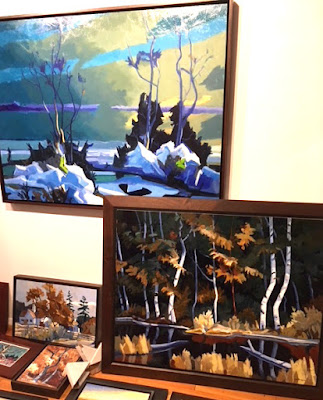Part III- Curator

Philip Koch, Memorial II, oil on panel, 6 1/2 x 13", 2010
Philip Koch, Edward Hopper's Rooms by the Sea, oil on
panel, 5 x 7 1/2", 1991, repainted 2010
I'v said there are three roles for the successful artist to master- Explorer, Magician-Builder, and Curator.
The Curator is the part of you that is the caretaker of your work. There is a physical side to this that I'll be returning to later.
Tellingly "Curator" comes from the same Latin root as the verb "to cure." As an artist you are the Curator of your vision. Likely as not it appears to you at first in bits and pieces. You gather them up, dust them off, and fit them together as best you can. Gradually you assemble them into something you can rightly call a vision. Making a painting is like making fine wine. It grows at its own pace and comes fully into season only when it's good and ready. Usually it takes way longer than one would like. A very big part of playing the Curator is to develop one's patience. Or at least learning how to act patient when that's not what you are feeling.
A reality most painters face is it also takes time for one of your paintings to find a home with a collector. You're charged with storing them safely in the meantime. While you do, you have to visit the herd to see how they're faring. This is a good thing. It provides you the opportunity for a second look at a piece long after your initial enthusiasm for it in the heat of its creation has cooled. You'll see a piece differently, and very often see something you can do to make the piece better. I think this is part of being a curator of your vision- taking the extra steps to refine a painting and clarify the chords of colors and teams of shapes that make the piece extraordinary. "Settling for" is rarely in your vocabulary.
I go back into very many of my pieces in just this way and almost always succeed in nudging them up to a higher level. There's a special power that comes from seeing with a fresh eye. Put your work away. Leave it unseen. Once you've forgotten all your preconceptions about it you can look again and see with your sharpest talents. A curator cares for work over time. An artist has to act like a curator in coming to know exactly what he or she was after in a particular piece. It can time weeks, months, or longer until you deeply understand what it was you were trying to say.
Of course you want to be critical in examining your work you've stored in your studio a while, but you also want to care for your openness to the work's potential. Vision and enthusiasm are delicate things. They need to be nurtured, sometimes like a tiny newborn, until they can grow strong enough to go out into the world. Taking your ideas seriously, caring for them, making them grow into something greater over time- that's all part of the Curator's job.
Above are two oils I re-painted just last week when I had them out in preparation to send them off to a gallery. When I looked at it again, I decided Memorial II had an overall very blue color to it. And generally it hugged a middle grey tonality a little too much. I moved into the sky, lightening it up and pushing it more towards a neutral grey. For heightened contrast I added the long flame of pink-orange cloud just above the horizon. And the lightest highlights in the water were nudged closer to pure white.
Edward Hopper's Rooms by the Sea was a small color study I painted some years ago during one of my residencies in Hopper's old painting studio on Cape Cod. This piece had served as the basis of a large studio oil. Looking at the study for the fist time in a long while, I realized I had let too much warm color creep into the shadow behind the big foreground door. I installed a cooler shadow in its place and created a much more telling space. The door now stands away from the wall more convincingly, and overall the closer studio room feels farther away from the yellow bedroom. It got a lot stronger.
There's a second side to this coin. The physical care of one's paintings. I'll talk more about that in the following post.



